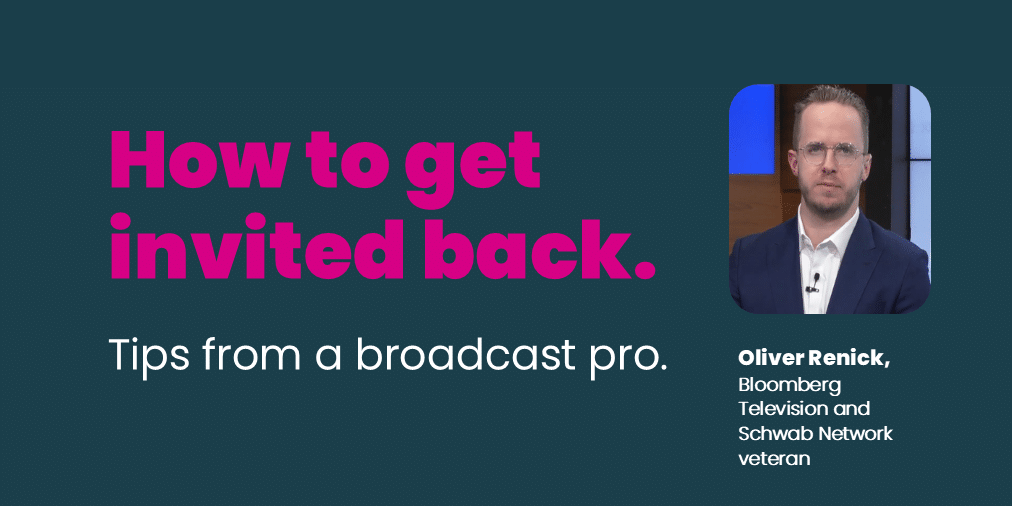
Oliver Renick’s tips for standing out in financial TV interviews
Key takeaways:
- Tell me something I don’t know, says former Bloomberg Television and Schwab Network veteran.
- Guests advised to bring the energy.
- Lowe Group media training to feature coaching by Renick.
When it comes to on-air hits, Oliver Renick has seen a thing or two.
In a decade-long career on Bloomberg Television and Schwab Network, Oliver spent an estimated 8,000 hours (that’s 330 days!) on live TV interviewing CEOs and CIOs, portfolio managers, analysts, economists and newsmakers—probably close to 20,000 interviews.
Now he’s launched his own communications consulting firm, Narrative Capital, so we asked Oliver to share some advice and anecdotes based on his deep experience doing broadcast interviews.
Q. What makes you immediately say to your producer, “Let’s have that person back on again sometime soon”?
A. Someone tells me something I didn’t already know: a fact, news item or insight that I haven’t heard before. Second is if they are passionate about what they do and are not afraid to talk about why their investment thesis is better than others. Third is if they are entertaining, energetic and have good timing. Fourth, if their hit generates a lot of interest and activity afterwards.
Q. What are some common mistakes you see people make in live interviews?
A. They are thinking more about what I want and what they think my audience wants than their own product or why they are on TV. Let me decide which questions and topics are relevant. The guest should have a clear, focused reason for why they are doing this hit. Trust me to make sure their goals are aligned with mine and my viewers’ goals.
Q. Would you say more guests come across too hot or too cold?
A. Most guests in the world of financial TV come across too cold. Too hot is almost not even a thing. Manic is not good, either, obviously, but energy is so hard to come by in finance; it’s preferred to overdo it than under.
Q. Any special advice for a successful remote interview? How about for panel discussions?
A. Do everything possible to make sure there is no delay, be comfortable in your physical presence and surroundings, don’t be too stiff.
For panel discussions, do your best to get a read of the room. Don’t be afraid to look out to the crowd and see how they are responding to the conversation to gauge their energy levels. Try to talk to them in addition to the moderator, but also respect the moderator as the anchor. Less is generally more in live panels: be respectful of other panelists’ time, and audience’s time. Rambling—live, in person—is the biggest mistake people make.
Q. What’s the craziest thing that ever happened to you or a guest on air and how did you/they handle it?
A. Guests have frozen, walked off, cursed, and said things that I had to immediately say were verifiably false or easily contested. I have made mistakes too—errors, awkward phrasings or swallowed coffee down wrong pipe.
Just try to minimize the effect. Own it, apologize and move on. Don’t be afraid to speak casually and say, “oops my dog is barking” or “sorry I sneezed, ha-ha.” It’s OK.
More generally, when it comes to awkward or tense moments on air, the priority is to respect your guest and let them get their points out, but the audience, and truth on behalf of that audience, always ranks No. 1.
Subscribe.
Receive the latest news and insights from Lowe Group.